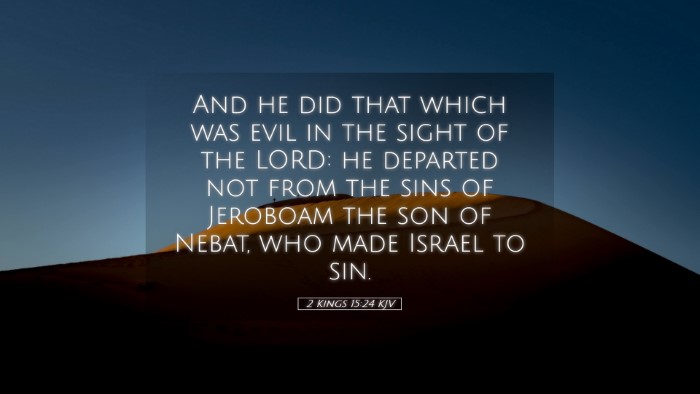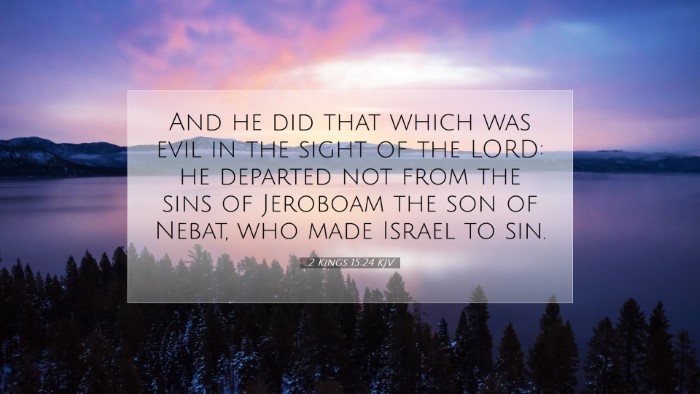Commentary on 2 Kings 15:24
2 Kings 15:24 states, "And he did that which was evil in the sight of the LORD; he did not depart from the sins of Jeroboam the son of Nebat, who made Israel to sin." This verse serves as a significant marker in the historical narrative of the kings of Israel, encapsulating the moral and spiritual decline of the nation during this period.
Overview of the Context
This verse refers to the reign of Amaziah, who ruled after his father Joash. The chronicler notes a pattern seen throughout many kings of Israel: an adherence to the "sins of Jeroboam." This phrase points toward the introduction of idolatry and the wrongful worship that characterized the northern kingdom of Israel, beginning with Jeroboam, who established golden calves for the people to worship (see 1 Kings 12:28-30).
Theological Implications
From a theological perspective, this verse highlights the gravity of sin and its repercussions for national leadership. As Matthew Henry elucidates, it indicates how the actions of rulers profoundly impact the spiritual health of their people. Henry states, “The measure of a king’s goodness is defined by their fidelity to God’s commandments, which, when disregarded, lead both the king and the nation into ruin.”
Albert Barnes adds further depth by emphasizing the inherent responsibility of leaders to uphold divine standards. The wickedness of a king is particularly damning because it sets a precedent for the people they govern. Barnes writes, “The king’s evil is not private but public. When he reigns in iniquity, it reverberates through the land and leads all to sin.”
Character of Amaziah
Amaziah is depicted as one who never strayed from Jeroboam's idolatrous practices. Adam Clarke provides insight into challenges faced by Amaziah; being surrounded by the prevailing culture of idol worship could have contributed to his inability to break free from such an established tradition. Clarke points out how cultural pressures can lead even the most well-intentioned into compromise, reminding readers today that even those with private faith may struggle against societal influences.
Sins of Jeroboam
The sins of Jeroboam symbolize a turning away from the worship of Yahweh, encompassing both idolatry and a rejection of covenant fidelity. Henry notes this sin as a "root of bitterness" that continues to plague the land of Israel, corrupting successive generations of both kings and common people alike. The enduring legacy of Jeroboam’s sin highlights the challenges of repentance and heroism in faith.
Application for Contemporary Readers
For modern pastors and theologians, Amaziah's example serves as a stark warning regarding the influence of leadership. Here are several key applications:
-
Leaders Must Cultivate Integrity:
The integrity of spiritual leaders can set a tone for their communities. Just as Amaziah followed Jeroboam’s sinful ways, today’s leaders can either promote righteousness or lead into moral ambiguity.
-
Reflect on Cultural Influences:
How often do we consider how surrounding cultures influence our practices and beliefs? Barnes reminds that it is crucial to remain vigilant against the seductive allure of idolatry in our modern context, be it in form of materialism, relativism, or even secular humanism.
-
Understanding the Generational Impact of Sin:
As Clarke indicates, the failures of one generation can echo through history. Leaders are encouraged to break cycles of sin and foster a culture of righteousness within their communities.
-
Importance of Personal Accountability:
Amaziah's failure is a reminder that leaders are also individuals who must remain accountable for their actions. Each believer, especially those in positions of authority, is called to be vigilant against complacency in faith.
Conclusion
In summary, 2 Kings 15:24 serves as an essential reflection on the themes of leadership, idolatry, and the consequences of sin within the community. It encourages a deep examination of both personal and communal practices in light of fidelity to God’s commandments. The insights from the commentaries of Matthew Henry, Albert Barnes, and Adam Clarke collectively remind us that the struggles faced by the people of Israel are not simply historical accounts but lessons relevant for today’s church, guiding ministers and believers alike in their daily lives.


